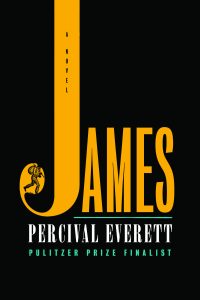

James by Percival Everett
Synopsis
When Jim overhears that he is about to be sold to a man in New Orleans, separated from his wife and daughter forever, he runs away until he can formulate a plan. Meanwhile, Huck has faked his own death to escape his violent father. As all readers of American literature know, thus begins the dangerous and transcendent journey by raft down the Mississippi River toward the elusive and unreliable promise of the Free States and beyond.
Brimming with the electrifying humor and lacerating observations that have made Everett a literary icon, this brilliant and tender novel radically illuminates Jim’s agency, intelligence, and compassion as never before. James is destined to be a major publishing event and a cornerstone of twenty-first century American literature.
(From the publisher.)
Purchase
Library
Reading Group Discussion Questions
2. Twain is well-known for his satirical writing. Where does Everett use humor and satire in James?
3. What social and cultural conditions does the novel’s satire mock or critique?
4. Reflect on Jim’s narration. Why does he switch between vernacular and standardized English? How did this code-switching affect your reading experience?
5. Describe Huck’s role in the story. How does Jim’s fugitive status, as well as race, color, class, age, and education, influence the relationship between the two characters?
6. James depicts the brutalities of slavery, particularly the violence inflicted upon enslaved women and girls, through the stories of Sadie, Lizzie, Sammy, and Katie. What are the unique threats that these characters must navigate? How does Jim react to the gendered violence that he encounters?
7. Return to Jim’s travels with the minstrel group. What does the novel say about the performance of race? How do blackface minstrelsy and racial passing complicate or undermine racial classification? Can all the characters be seen as performers of race?
8. Jim’s quest for freedom parallels his quest for literacy. Discuss the key moments on his journey to writing his story. What are the texts that he studies? Who are the characters who give him the tools and encouragement to write?
9. James references author William Wells Browning, composer Daniel Decatur Emmett, and philosophers John Locke, Jean-Jacques Rousseau, and Voltaire. Consider researching these figures. How do they influence your understanding of the historical period?
10. Discuss the use of religion and superstition in the story.
11. Were you surprised by Jim’s revelation in chapter one of part three? Returning to earlier passages, can you identify any moments of foreshadowing from Everett? How would you characterize Huck’s reaction? Have you ever learned something shocking about your family’s history?
12. James features an ensemble of fugitive and enslaved characters. How does Everett affirm the humanity of these characters in his writing? Was there one who was particularly memorable to you?
13. The Mississippi River is central to the landscape of the novel. What is the role of the river? How did it shape the political landscape of the region and the events of the novel?
14. Reflect on the title, James. What’s the significance of Jim renaming himself? Why do you think Everett chose to title the novel in this way?
15. What was your reaction to the novel’s ending? What do you think the future holds for James and his family?
16. After reading James, can you think of another character from a classic text that you would like to read as the narrator of their own story?
(Questions issued by publishers.)
Additional Book Club Resources
Other Works by Percival Everett
Novels
• Suder (1983)
• Walk Me to the Distance (1985)
• Cutting Lisa (1986)
• Zulus (1990)
• For Her Dark Skin (1990)
• God’s Country (1994)
• Watershed (1996)
• The Body of Martin Aguilera (1997)
• Frenzy (1997)
• Glyph (1999)
• Grand Canyon, Inc. (2001)
• Erasure (2001)
• American Desert (2004)
• Wounded (2005)
• The Water Cure (2007)
• I Am Not Sidney Poitier (2009)
• Assumption (2011)
• So Much Blue (2017)
• Telephone (2020)
• The Trees (2021)
• Dr. No (2022)
• James (2024)
Poetry
• re:f (gesture) (2006)
• Swimming Swimmers Swimming (2010)
• There Are No Names for Red (a collaboration with Chris Abani; paintings by Percival Everett, 2010)
• Trout’s Lie (2015)
• Sonnets for a Missing Key (2024)
If You Liked James, May We Recommend …
The Good Lord Bird, James McBride
Washington Black, Esi Edugyan
Pudd’nhead Wilson, Mark Twain
Up from Freedom, Wayne Grady
The Water Dancer, Ta-Nehisi Coates
The Underground Railroad, Colson Whitehead
Passing, Nella Larsen
Caucasia, Danzy Senna
Conjure Tales and Stories of the Color Line, Charles W. Chesnutt
The Autobiography of an Ex-Colored Man, James Weldon Johnson
Links of Interest for Your Book Club Discussion
The Percival Everett International Society
Brown Alumni Magazine, “Percival Everett Thinks You’re Smart”
The New Yorker, “Percival Everett Can’t Say What His Novels Mean”
UC Santa Cruz, “A Deep Read Interview: Percival Everett and the Making of James”
The Guardian, “Deciding To Write a Book is Like Knowingly Entering a Bad Marriage”
Brick, A literary Journal, “Interview with Percival Everett”
Elle, “James Author Percival Everett on Freedom, Violence, and the Lure of Huckleberry Finn”
Los Angeles Review of Books, “A Different Language: A Conversation with Percival Everett”
